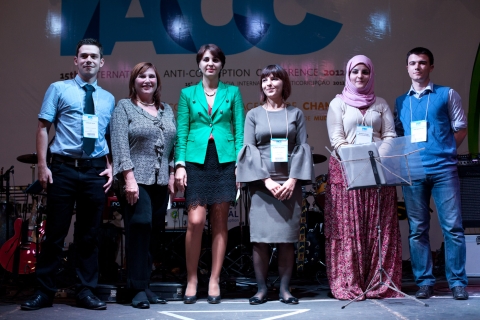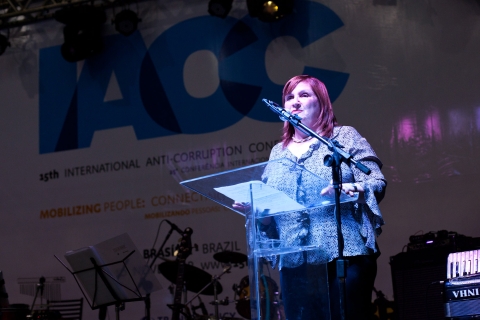
On the podium, after award winners of the Social Entrepreneurship Initiative were announced at the 15th International Anti-Corruption Conference in Brasilia. From left to right are: Cansarp Kaya of Turkey; Ronnie Lovler, United States; Irina Codrean, Moldava; Elena Calustro, Romania; Mariam Adnan, Yemen and Cristian Botan, Romania. Photo by Virginie Nguyen Hoang.

Ronnie Lovler, former Knight International Journalism Fellow in Colombia, at the podium in Brasilia, thanking the jury of the Social Entrepreneuship Initiative at the 15th International Anti-Corruption Conference, for selecting the Monitor de Corrupción in Colombia for an award. The Monitor de Corrupción is a joint project with the Consejo de Redacción. Photo by Virginie Nguyen Hoang.
The Monitor de Corrupción, a project that I initiated with the Consejo de Redacción as a Knight International Journalism Fellow in Colombia, won a mini-grant for social innovation from the 15th International Anti-Corruption Conference.
The IACC Social Entrepreneurship Initiative was started this year to encourage projects that boost transparency and accountability by developing new tools to help fight corruption.
More than 200 applicants competed for one of three 5,000 euro grants that will be distributed to advance the award-winning projects. Funding is provided by Transparency International.
Three other SEI awards were made separately to three young adults who made proposals during Transparency’s 2012 summer school program.
The award money will be used to advance the Corruption Monitor, our digital, crowdsourced map. It tracks corruption in Colombia on a two-tiered platform that highlights input from journalists and citizens.
The Consejo de Redacción is an organization of investigative journalists in Colombia. We kicked off the map in July with input from reporters. Our next step is to reach out to citizens with a broader appeal to civil society. The mini-grant will help us do that. We are scheduled to receive the funding in early 2013.
Our award was announced at the 15th International Anti-Corruption Conference in Brasilia, where I shared brief insights about our motivation to use “these new digital tools … to visualize corruption and engage in a bit of show and tell” to get people involved.
Joining me on the podium were five other award winners.
They were Elena Calustro of Romania. She received an award for Funky Citizens, a project to increase transparency in public spending. Irina Codrean also received an award for working to improve transparency in Moldova’s construction business.
The three young adult SEI summer school winners were Cristian Botan of Romania, who won for a project on transparency in civil service recruitment and promotion; Cansarp Kaya of Turkey, who took an award for a project to blacklist sports clubs and players who fix matches; and Mariam Adnan of Yemen, who won for an anti-bribery campaign.
We all hope to come back and report on the progress of our projects at the 2014 anti-corruption conference in Tunisia.
The Brasilia conference closed with a call to step up the fight to end impunity and promote “a culture of transparency leading to a participatory society in which leaders are accountable.” More than 1,900 representatives from the public, private and non-profit sectors attended.
The Corruption Monitor is one of three projects I started as a Knight Fellow with the support of the International Center for Journalists. The others are a crowdsourced crime map, Pilas Bogota, done in partnership with El Tiempo newspaper in Bogotá, and the launch of the first chapter of Hacks/Hackers in Colombia in Bogotá.